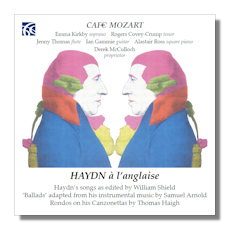
The Internet's Premier Classical Music Source
Related Links
- F.J. Haydn Reviews
- Latest Reviews
- More Reviews
-
By Composer
-
Collections
DVD & Blu-ray
Books
Concert Reviews
Articles/Interviews
Software
Audio
Search Amazon
Recommended Links
Site News
 CD Review
CD Review
Franz Joseph Haydn

Haydn à l'anglaise
Songs, Canzonettas & Instrumental Music
- Ballad "The fleeting Hours" 1,2,5
- Ballad "Morning" 1-5
- Song "Love in Return" 1,4
- Canzonetta "Sailor's Song" 2,5
- Rondo 5
- Song "Too late, Mother" 1,4
- Song "An old Story" 2-4
- Song "Contentment" 1,3,4
- Song "The manly Heart" 2-5
- Ballad "Youth and Beauty" 1-5
- Song "The Comforts of Inconstancy" 2,4
- Variations 5
- Ballad "Werter's Sonnet" 2-5
- Song "The Knotting Song" 1-5
- Ballad "Peace and Content" 1-5
- Canzonetta "My Mother bids me bind my Hair" 1,5
- Rondo 5
- Song "Molly Carr" 2,4
- Ballad "Evening" 1-5
- Song "Life is a Dream" 1,2,4,5
1 Emma Kirkby, soprano
2 Rogers Covey-Crump, tenor
3 Jenny Thomas, flute
4 Ian Gammie, guitar
5 Alastair Ross, square piano
Cafe Mozart
Nimbus Alliance NI6174 63mins
Contrary to common perception, Haydn's love affair with England did not start on New Year's Day 1791, when he set foot on British soil for the first of his two visits. Way back in 1783, Willoughby Bertie, the 4th Earl of Abingdon had originally invited Haydn to London, and three years later, the respected composer William Shield adapted some of Haydn's original songs in German, published by the master in 1781, with English words. In 1784 Haydn published a second set of songs which proved to be as successful as the first batch, and the popularity of these pieces provoked an interesting development. In the absence of other original songs by the composer, editors turned to his instrumental material, such as string quartets and piano sonatas, singling out memorable melodies and providing them with English texts. And this is what another highly regarded composer did in 1787. Dr. Samuel Arnold issued a collection of 12 English Ballads which were enthusiastically welcomed by a wide spectrum of the British public, a fact which led to their subsequent publication by Longman and Broderip.
As a counterpoint to the adaptation of instrumental music into songs, this recording also highlights the other side of the coin; that of vocal music being arranged for the instrumental medium. Haydn's pupil Thomas Haigh did just that. He took two of the master's "Canzonettas" published in 1790 and transformed them as "Rondos" for the "Piano Forte".
This highly fascinating and enthralling disc not only encapsulates an exciting potpourri of Haydn magic, but also gives the listener a profound insight on the various riches of this particularly inspired period in European musical history. Performances abound with joy and wit, and each miniature gem is imbued with a charm and grace that are quite infectious. Superb sound and annotations complete a most unusual yet welcome issue which should throw much new light on Haydn's life and career.
Copyright © 2012, Gerald Fenech




















